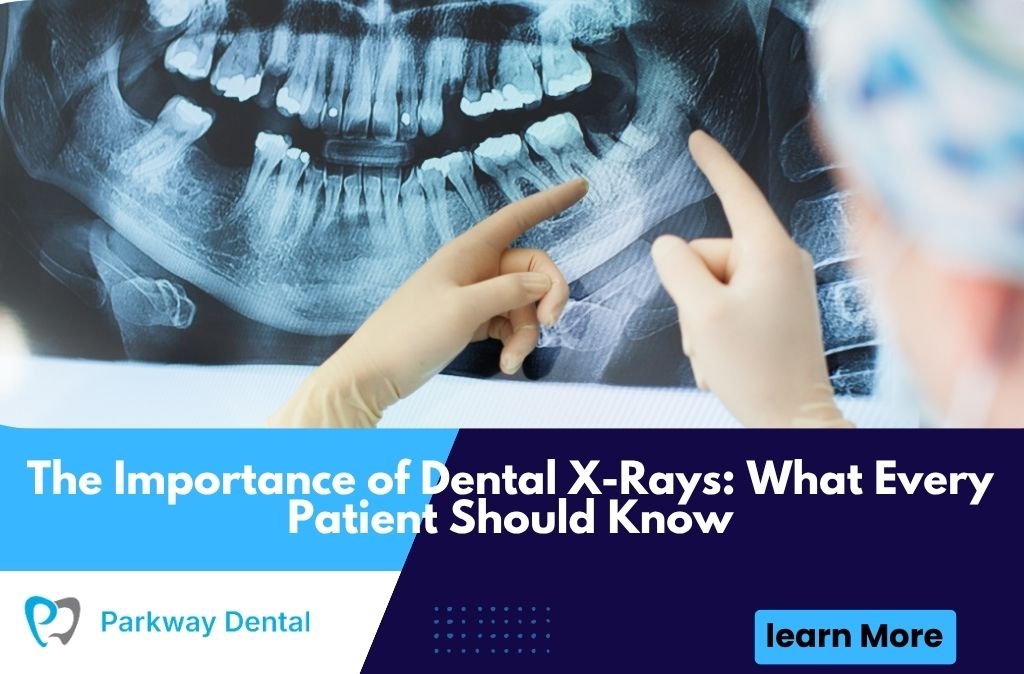Dental X-rays are one of the most essential tools in modern dentistry. They provide a detailed look at what’s happening beneath the surface of your teeth and gums—something the naked eye simply can’t detect. For patients visiting a Dentist, understanding the importance of dental X-rays helps take the mystery out of your dental visits and empowers you to care for your smile confidently.
In this article, we’ll break down what dental X-rays are, how they work, when they’re needed, and why they matter so much for your long-term oral health.
What Are Dental X-Rays?
Dental X-rays, also known as radiographs, are images that allow dentists to see inside and around your teeth. They use low levels of radiation to capture pictures of your teeth, roots, jawbones, and surrounding structures.
These images help detect problems early—sometimes even before symptoms start—making treatment easier, less expensive, and more effective.
Why Dental X-Rays Are Important
Dental X-rays reveal the full story of your oral health. They can show:
- Cavities hidden between teeth
- Infections in the bone
- Impacted teeth (like wisdom teeth)
- Tooth root problems
- Bone loss from gum disease
- Developmental issues in children
Without X-rays, many serious dental issues could go unnoticed until it’s too late or becomes painful.
Types of Dental X-Rays and Their Uses
Dental X-rays come in different types, each serving a unique purpose. Bitewing X-rays detect cavities between teeth, periapical X-rays focus on the roots, panoramic X-rays give a full view of the jaw, and occlusal X-rays show tooth alignment. Each helps your dentist spot hidden issues and plan accurate treatments.
Bitewing X-Rays
These are the most common. They show the top and bottom teeth in one area and help detect cavities between teeth and monitor bone levels.
Periapical X-Rays
These focus on one or two teeth from root to crown. Dentists use them to check for root infections, deep cavities, or abscesses.
Panoramic X-Rays
This full-mouth X-ray shows all teeth and the jaw in one image. It’s great for spotting impacted teeth, jawbone problems, and planning orthodontic treatment.
Occlusal X-Rays
Used mostly in children, these X-rays show how the upper and lower teeth align and detect extra or missing teeth.
Are Dental X-Rays Safe?
Yes—dental X-rays are very safe. The radiation exposure is extremely low, especially with modern digital X-ray systems. Dentists also use protective aprons and collars to shield the body.
For context, you’re exposed to more radiation from a short airplane flight than a single dental X-ray.
Pregnant women should inform their dentist, but with proper precautions, even they can safely receive necessary X-rays in certain situations.
How Often Should You Get Dental X-Rays?
It depends on your oral health history, age, and risk factors.
For Adults:
- Every 6 to 18 months if you have ongoing dental issues.
- Every 2 to 3 years if your teeth and gums are generally healthy.
For Children:
- More frequently, since their mouths are still developing and they’re more prone to cavities.
Your Dentist will recommend the best schedule for you based on your needs.
Benefits of Early Detection with Dental X-Rays
Catching a problem early can save your tooth, your time, and your money. Here’s how:
- Fewer complications: A small cavity is easy to fix. Left untreated, it can turn into a root canal or extraction.
- Lower costs: Early treatment is almost always more affordable.
- Peace of mind: Knowing what’s happening beneath the surface means fewer surprises later on.
Dental X-Rays for Children and Teens
Children benefit greatly from routine X-rays because:
- Dentists can monitor the growth of permanent teeth
- Detect spacing or crowding issues
- Catch early signs of decay in baby and adult teeth
For teens with braces or orthodontics, X-rays help guide treatment and ensure the teeth move safely.
What to Expect During a Dental X-Ray
The process is fast and painless. Here’s what happens:
- You’ll sit upright or lie back, depending on the machine
- A sensor or film is placed inside your mouth
- You’ll be asked to hold still for a few seconds
- The machine captures the image instantly or develops it quickly
Most dental X-ray visits take just a few extra minutes during your checkup.
Digital vs Traditional X-Rays
Modern digital X-rays offer several advantages:
- Less radiation (up to 90% lower than film)
- Faster processing—images appear instantly
- Clearer results for better diagnosis
- Easy sharing between dentists or specialists
If you’re seeing a Dentist, chances are they’re already using this safer, more advanced technology.
Who Needs Dental X-Rays Most?
Some people may need X-rays more often than others, including:
- Smokers
- People with gum disease
- Those with frequent cavities
- Patients with root canals, crowns, or bridges
- Individuals experiencing pain, swelling, or trauma
If you fall into any of these categories, talk to your dentist about a customized X-ray schedule.
Conclusion
Dental X-rays are a powerful part of preventive care. They help your dentist diagnose hidden problems, monitor changes, and create the right treatment plan—long before pain or visible signs show up.
Skipping X-rays may save a few minutes during your visit, but it risks missing crucial issues that can lead to bigger problems down the road.
If you’re due for a dental checkup or have questions about X-rays, schedule a visit with a trusted Dentist in West Roxbury, MA. Your oral health—and your peace of mind—depend on it.
FAQs
Are dental X-rays safe for children?
Yes, they are very safe. Modern equipment uses minimal radiation and special shields to protect your child.
Will I need X-rays at every dental visit?
Not always. It depends on your oral health, risk level, and any ongoing treatments.
Can I refuse dental X-rays?
Yes, but it’s not recommended. Without X-rays, your dentist can’t fully assess hidden dental issues.
How much do dental X-rays cost?
Many insurance plans cover routine dental X-rays. Out-of-pocket costs vary but are usually affordable.
What happens if a problem is found on the X-ray?
Your dentist will explain the issue, show you the image, and walk you through the treatment options clearly.






